Mario Balotelli, volleyball, and Bitcoin in Turkey
When inflation is high, dollar based assets are in high demand
Istanbul is Turkey’s megacity. Its busyness reminds me of London, New York, or Hong Kong. But with it’s own unique culture. It’s one of the few cities in the world that sits across two continents - in this case, Europe and Asia. It really is a mix of East and West.
For Western tourists Turkey makes for an easier travel experience than say Morocco. Compared to North Africa, more people speak English, there’s a wider choice of food, and modern shopping malls can be easily found. Yet in one day, a traveler can experience a thousand years of history within little more than a square mile.

The old town of Istanbul features the remains of a Roman Hippodrome, which was used for chariot racing. The Hagia Sophia Church, built by the Byzantines in 537 AD, today stands as the Hagia Sophia Grand Mosque. Nearby, the Blue Mosque is a mere 400 years old.
When I visited Istanbul at the end of 2021, I left my hotel, and whilst on my way to explore the historical sites I saw the below billboard. I had to take a second look. Yes, it was Mario Balotelli, the footballer, advertising a Bitcoin exchange.
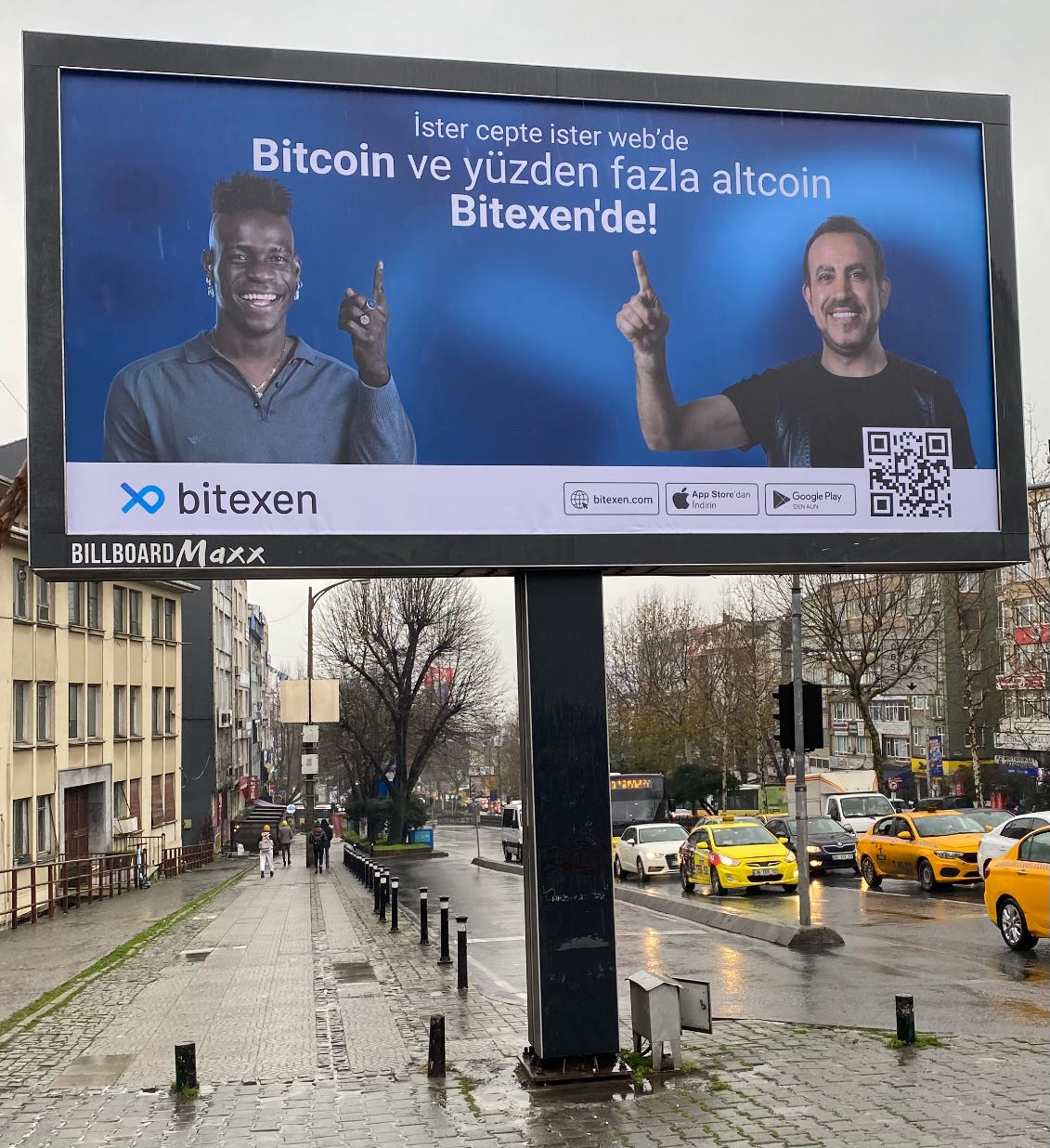
At this time, Balotelli was playing in the Turkish Süper Lig for Adana Demirspor.
He’s famous in England for his short tenure playing for Manchester City, including his goals in an amazing 6-1 win over Manchester United back in 2011. When he was at the peak of his career, controversy followed him. As this contemporary article from The Guardian explains:
Last Saturday it was reported that Manchester City footballer Mario Balotelli had set his house alight with fireworks. On Sunday, he celebrated the first of his two goals in the 6-1 thrashing of Manchester United by lifting his shirt to reveal a vest that said 'Why always me?'
By Tuesday, there were photographs in newspapers showing he had become Manchester's ambassador for firework safety. Solemn and unsmiling, he held a poster of rockets exploding into the sky accompanied by the message: "How safe are you this Bonfire Night?"
He also used the opportunity to reveal that it was friends who set his towels on fire in his bathroom, not him, and that they had been suitably admonished. Just another week in the life of the Premier League's most talked-about footballer.
As you can see, Balotelli had a wild side. He had several bust-ups with his coach, Roberto Mancini, which led to him leaving Manchester City earlier than planned. Despite his talent, Balotelli struggled to maintain his form after that one stunning season at Manchester City.
In the past decade, he’s moved around, playing for various teams in France, Switzerland, England, Italy, and now Turkey. Bitexen, the cryptocurrency exchange, is the main sponsor of Balotelli’s team, and as one of the most recognisable players in the league, he fronted their ad campaigns, including this TV advert.
Turkey's second most popular sport, after football, is volleyball. The women's game is as popular, perhaps even more so than the men's game. The sport is often shown on TV, and the strength of the women's league means that players move to Turkey to play professionally from countries as diverse as the USA, Thailand, Serbia, and Brazil. In October 2023, the women's national volleyball team won the European Championship - this was on the back of other successes. As reported in The New York Times:
Affectionately referred to as “the Sultans of the Net,” the team won the Volleyball Nations League championship in July in Arlington, Texas, and became the world’s top rated women’s national team, according to FIVB, the sport’s international governing body.
On Sunday, the Turkish team faced Serbia in the final match of the European championship in Brussels — and won, 3-2.
At home, the team’s games are aired live by the state broadcaster and its players exude star power. Legions of followers on social media celebrate their accomplishments, track their frequent hair-color changes and speculate about their romantic entanglements.
The star power is evident. Notably, the team is a great model for many young women in a society that's a mix of liberal, perhaps call it Western values, and a more conservative side. When I was back in Turkey earlier this year, I saw a billboard in the street celebrating the success of the women's national team. The billboard roughly translates as "There is always more support - we heartily congratulate the Sultans of the Net, who are the European champions". At the bottom right of the billboard, you can see that one of the team's main sponsors is a Bitcoin exchange called BtcTurk.
Apart from these city centre billboards, anyone traveling through Istanbul’s airport will see countless adverts for BtcTurk. However, Turkey banned the use of Bitcoin as a payment mechanism back in mid-2021. If you can’t use Bitcoin to pay, then why are cryptocurrency exchanges still advertised so widely? In a word, inflation.
In Turkey, the rate of inflation has been above 40% since the start of 2022 and at 65% at the start of this year. The central bank governor is now forecasting inflation to be down to 36% by the end of 2024. Yet many argue that this core inflation rate often underestimates the real impact felt on the ground. The government increased the minimum wage by 49% in January of this year. This increase in the minimum wage was welcomed by many, but the central bank governor acknowledged that it contributed to the uptick in inflation. This situation highlights the ever-present risk of a wage-price spiral that can be hard to control.
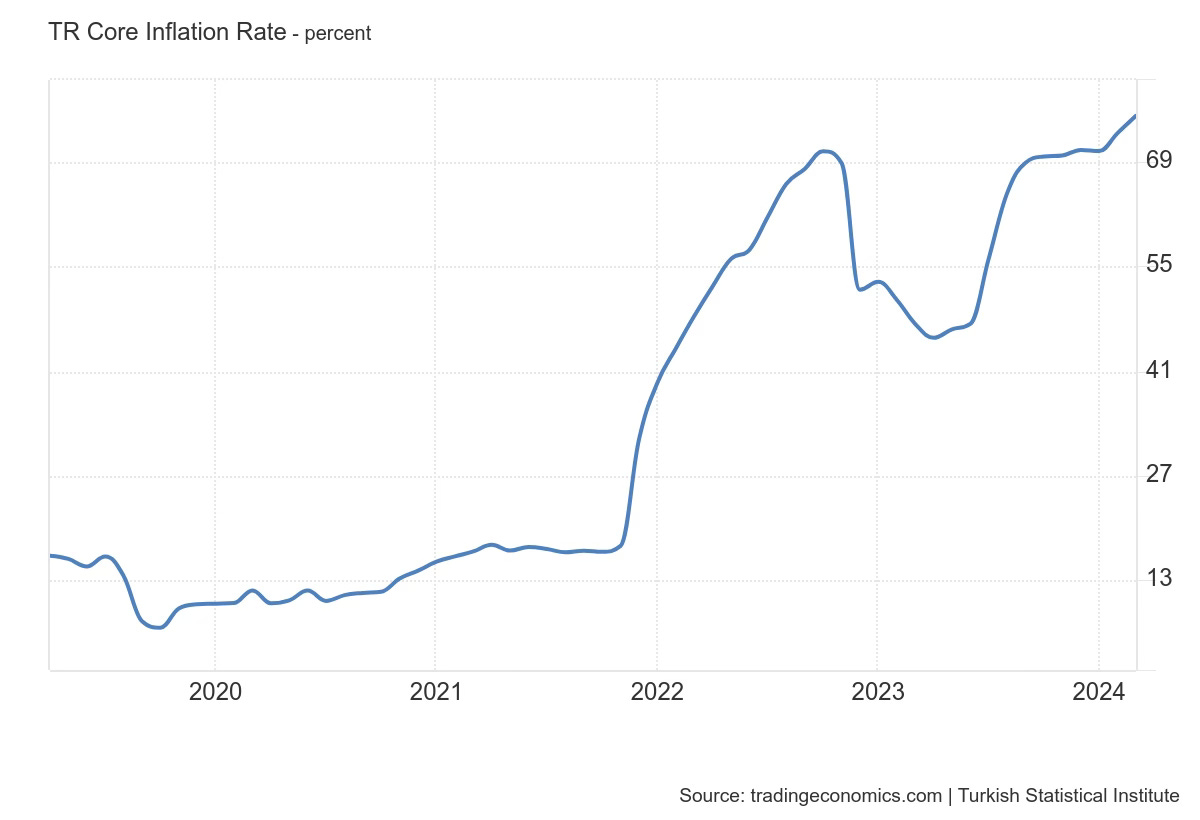
Despite high inflation, Turkey has been slow to increase interest rates. This is strange. In standard economic theory, raising rates is the main tool to cool the economy and fight inflation. But in early 2024, interest rates were increased significantly, with one of the key benchmark rates going from 8.5% to 45%.
Countries with high inflation and high-interest rates often see their currencies lose value. The Turkish Lira has been steadily losing value against major currencies such as the US Dollar, Euro, and the Pound. The first time I visited Turkey in November 2012, I got 2.75 Turklish Lira for one Pound. But in January 2024 the exchange rate was such that one Pound got 38 Turkish Lira. That’s quite a shift.
A declining currency leads to imported goods becoming more expensive, further adding to inflation. With a declining currency, the purchasing power of Turks traveling abroad has dropped substantially, making it prohibitively expensive for much of the population to get on a plane for a holiday or to study abroad.
The above video is a couple of years old, yet inflation has gotten worse since then. It highlights some of the challenges that Turks face in coping with high inflation. And how some are turning to cryptocurrencies to help preserve their wealth.
When getting paid, many Turks think about how they can preserve their wealth. There are several ways to do this. A tour guide I spoke to told me that after he gets paid each month, he converts a portion of his salary into Euros and keeps the cash at home to help save for the future. Some Turkish banks offer customers the ability to open an account in foreign currencies. Savings can be kept in Dollars or Euros and switched back to Lira when needed. Something like this is rare in the West. Most Westerners usually keep money just in their home currency.
Bitcoin and other cryptocurrencies are also options that can be used with wealth preservation in mind. It's an example of how Bitcoin has moved from its original intended purpose - a currency for payment - to being a store of value. Digital Gold. As Bitcoin is priced in US Dollars, Turks can get exposure to both Bitcoin and indirectly US Dollars by buying Bitcoin. Cryptocurrency can be volatile, but if you're used to your home currency being just as turbulent, then cryptocurrency may not feel like a risk at all.
One of the highlights of any trip to Istanbul is going to the Grand Bazaar. Until you’ve been there, any description will not do it justice. There are 4,000 shops across an area of 30,700 square metres, and almost anything you want can be purchased.
Amongst the shops selling carpets, tourist trinkets, and serving tea, you will also find some Bitcoin ATMs. You can feed in cash (notes) in either Turkish Lira or US Dollars and scan a QR code to receive - a portion of - Bitcoin in a wallet app on your phone.
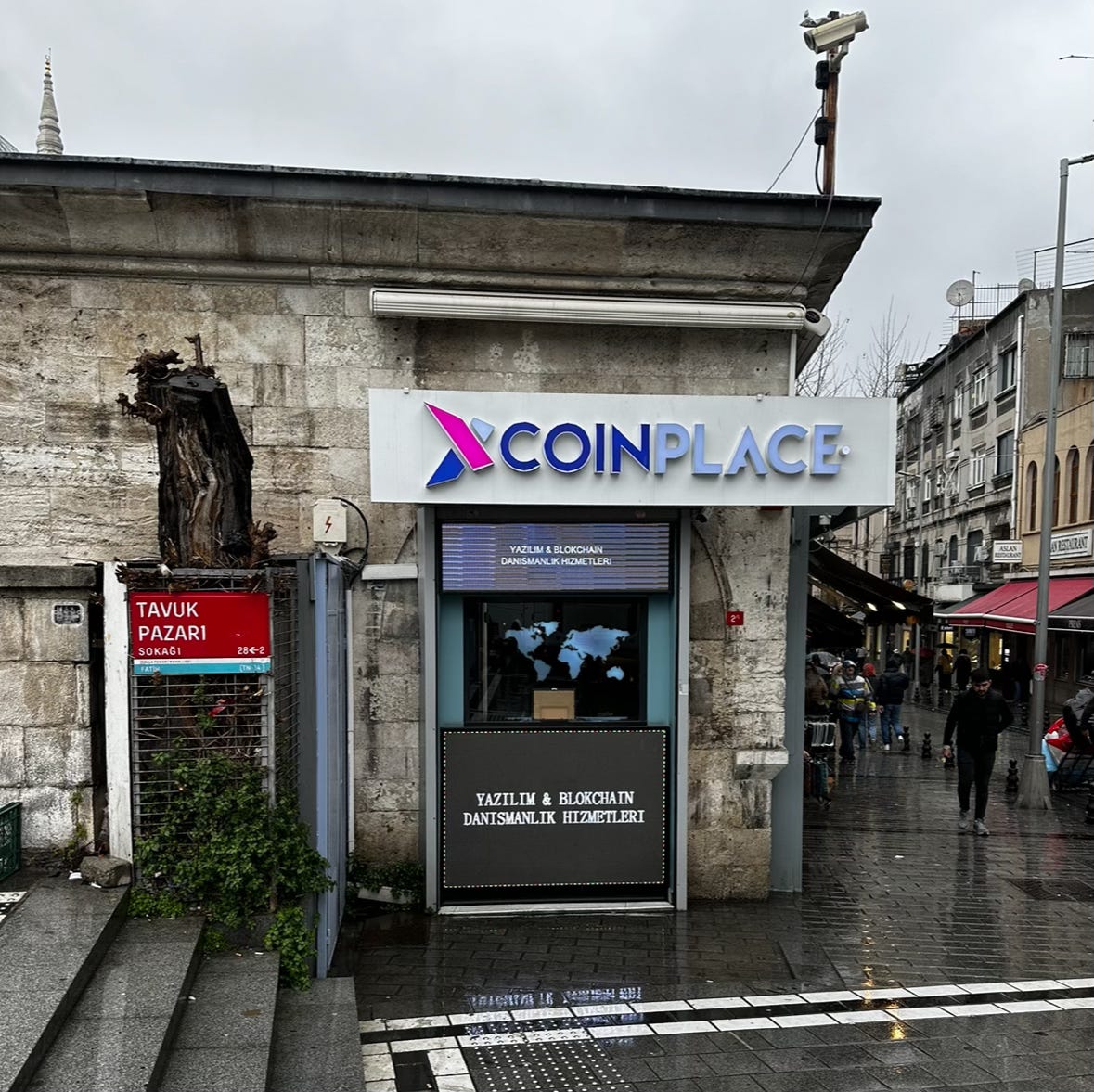
As well as cryptocurrencies, other assets priced in US Dollars are also popular as a form of wealth preservation. The prevalence of such assets can be seen on the front page of the website of one of Turkey's leading newspapers, Cumhuriyet (meaning Republic in English). At the top of Cumhuriyet's homepage, the Turkish Lira's exchange rate against the US Dollar, Euro, and Gold are shown. Gold has never gone out of fashion as a way to preserve wealth, and now Bitcoin has joined the party. In Turkey, there's room and a need for multiple ways to protect one's wealth.



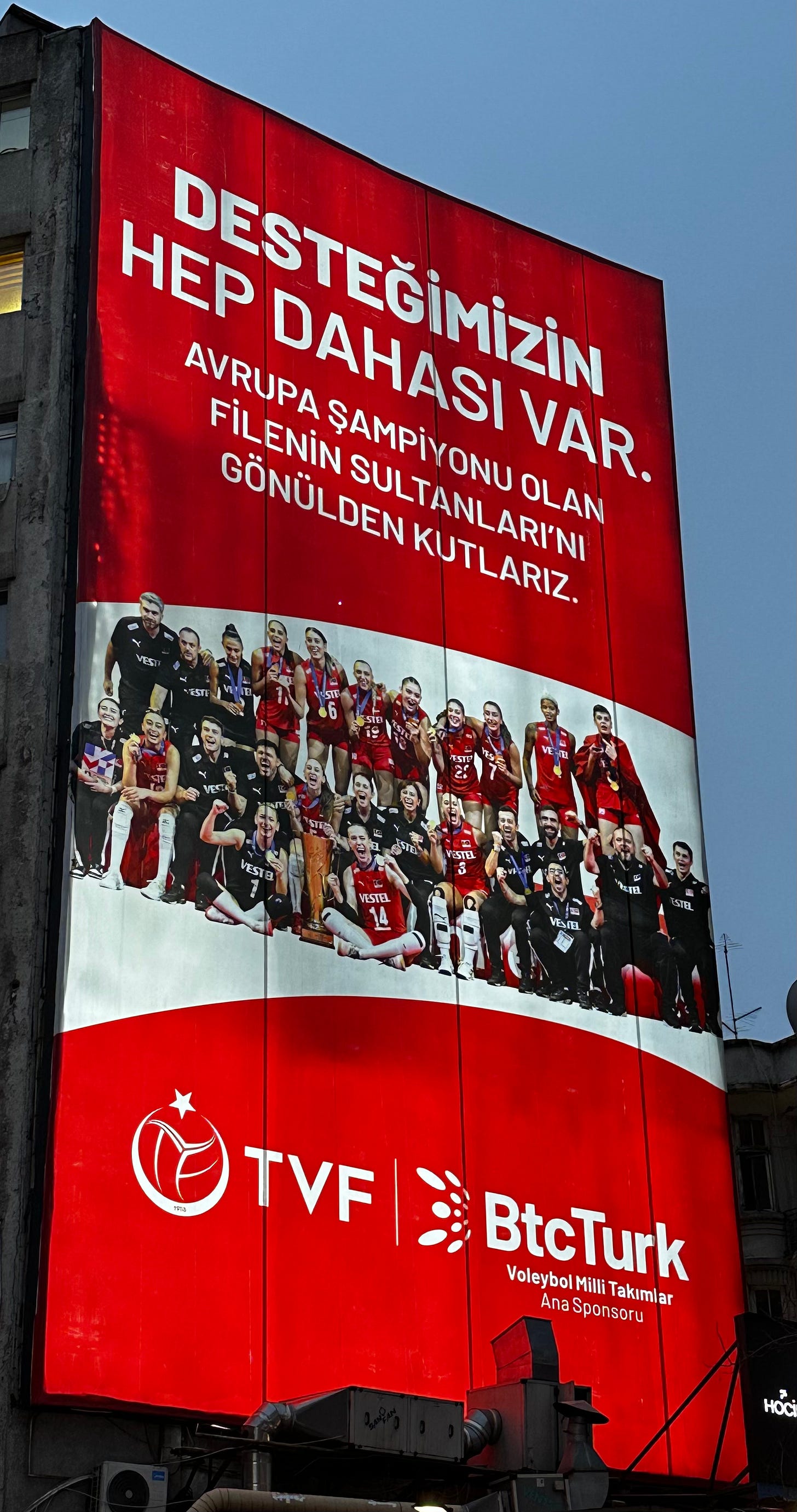
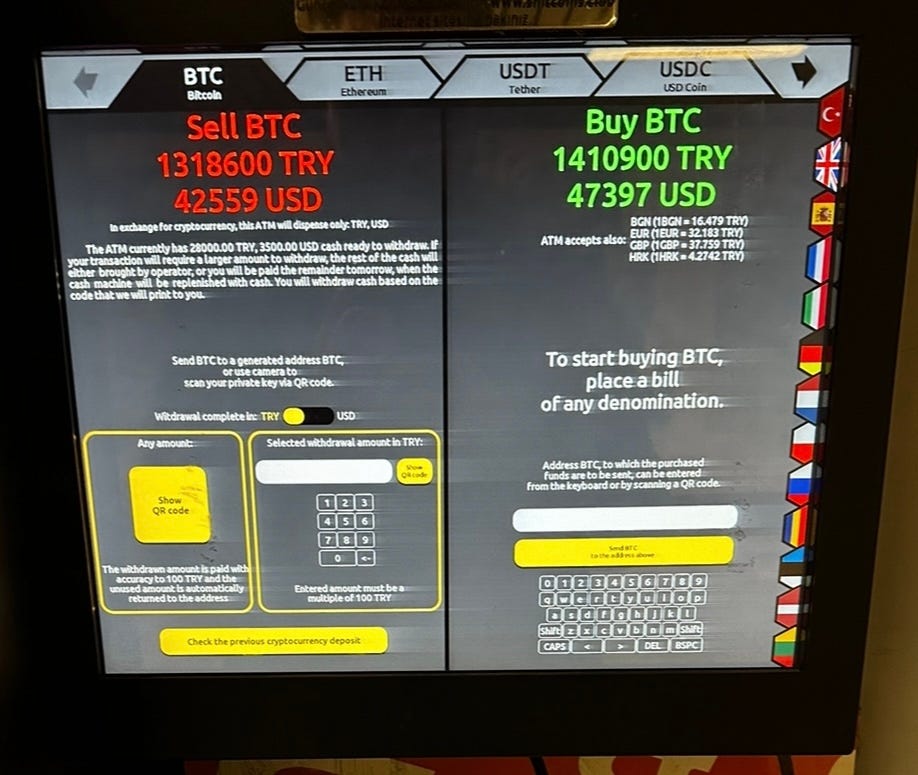
Football + Finance! Love it ❤️